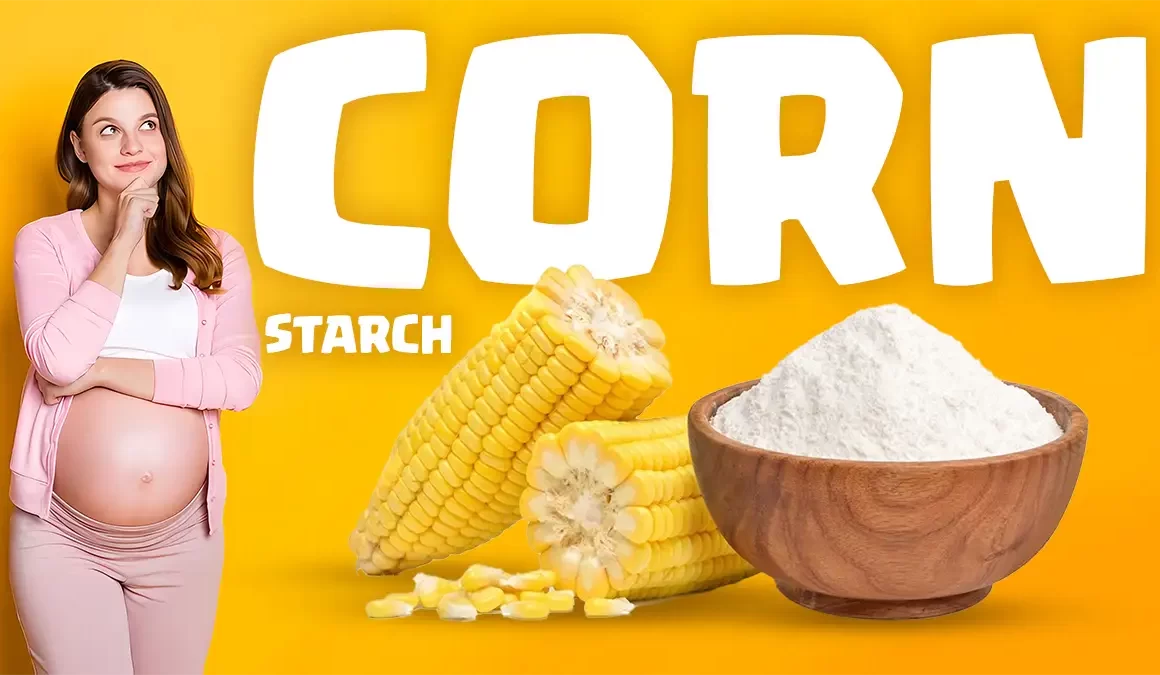- 🤰 Cornstarch is generally considered safe for consumption during pregnancy in moderate amounts.
- 🚫 Cornstarch does not contain gluten, making it suitable for individuals with gluten sensitivities or celiac disease.
- ⚠️ It is important to ensure that the cornstarch used is labeled gluten-free to avoid cross-contamination.
- 🤔 Cornstarch is generally well-tolerated and does not typically cause adverse effects when consumed in moderation during pregnancy.
- 🍽️ However, cornstarch has a low nutritional value compared to whole grains and nutrient-rich foods.
- 🥗 It is advisable to prioritize a varied and balanced diet during pregnancy, focusing on whole foods for essential nutrients.
What is Cornstarch?
- 🌽 Cornstarch, also called corn flour, is a fine powder derived from corn kernels’ endosperm.
- 🥣 It is primarily composed of carbohydrates and acts as a thickening agent in cooking.
- 💰 Cornstarch is widely accessible and affordable.
- 👅 It has a neutral taste, which contributes to its popularity as an ingredient in recipes.
- 🍳 Cornstarch is used in numerous culinary applications.
- 🌾 It is obtained from the endosperm of corn kernels.
- 👩🍳 Cornstarch enhances the texture and consistency of various dishes.
Safety of Cornstarch during Pregnancy
Cornstarch is safe for pregnant women as a gluten-free option with various culinary uses, but moderation is important to avoid digestive problems and nutrient imbalances.
Potential Risks and Concerns
Cornstarch is safe to consume, but pregnant women should be cautious due to potential contamination, allergies, and sensitivities.
- 🌽 High-quality cornstarch is essential to avoid contamination.
- 📦 Reputable brands and proper packaging ensure safety.
- 🌾 Corn allergies or sensitivities are rare but possible.
- ⚠️ Consult a healthcare provider if you have known allergies or sensitivities.
- 🍽️ Ensure you have medical guidance before consuming cornstarch.
- 🔒 Proper storage instructions help maintain quality.
- 🚫 Avoid cornstarch if you have a confirmed allergy or sensitivity.
Uses of Cornstarch during Pregnancy
Safe uses of cornstarch during pregnancy for common discomforts.
1. Skin Irritations and Rashes
Pregnancy hormones may lead to skin irritations and rashes. Applying cornstarch topically can help soothe and alleviate these issues by absorbing moisture and reducing friction on the skin.
2. Maternity Clothing
Dusting cornstarch on the body or inside clothing reduces discomfort caused by tight or rubbing clothing during pregnancy.
3. Chafing and Sweat Absorption
The increased weight and hormonal changes during pregnancy can lead to chafing in sensitive areas, such as the inner thighs or under the breasts. Cornstarch can act as a natural absorbent and reduce friction, providing relief from chafing and excessive sweating.
4. Natural Remedies for Pregnancy Discomforts
Cornstarch is a natural remedy that can relieve pregnancy discomforts like itching from stretch marks or dry skin when applied as a thin layer on the skin.
Precautions and Recommendations
🔬 Patch testing: Perform a patch test on a small portion of the skin before applying cornstarch to a larger area to check for adverse reactions or allergies.
🌽 Quality and purity: Choose high-quality cornstarch products that are free from contaminants. Look for organic or non-GMO options when available.
💡 Application and usage: Sprinkle a small amount of cornstarch onto hands or a clean cloth and gently apply to the desired area. Avoid excessive amounts to prevent clumping and mess. Keep away from eyes and nose to avoid irritation.
Alternatives to Cornstarch during Pregnancy
If you prefer to avoid cornstarch during pregnancy, there are alternative options available:
🌱 Arrowroot Powder:
- Derived from the rootstock of tropical plants.
- Used as a thickening agent.
- Can substitute cornstarch in cooking and baking.
🍚 Rice Flour:
- Made from finely ground rice.
- Functions as an alternative to cornstarch.
- Possesses thickening properties.
- Versatile ingredient for various recipes.
🌾 Oat Flour:
- Produced by grinding oats.
- Nutritious substitute for cornstarch.
- Suitable for thickening sweet and savory dishes.
FAQs
Moderate consumption of cornstarch is safe during pregnancy, but excessive intake should be avoided.
Cornstarch absorbs moisture and reduces diaper rash on a baby’s skin, but check for corn allergies first.
Cornstarch can temporarily relieve vaginal itching in pregnancy, but medical advice should be sought if the itching continues or worsens.
Cornstarch can reduce diaper rash symptoms by absorbing moisture and reducing friction. However, healthcare professionals suggest using baby-specific rash creams.
Cornstarch is generally safe for use during pregnancy, but people with corn allergies or sensitivities should be cautious and conduct a patch test before applying it to a larger skin area.







